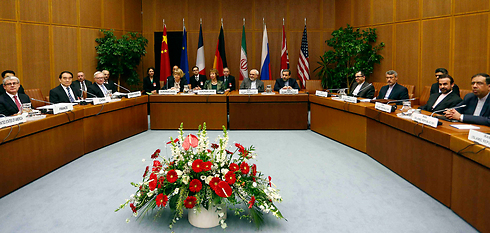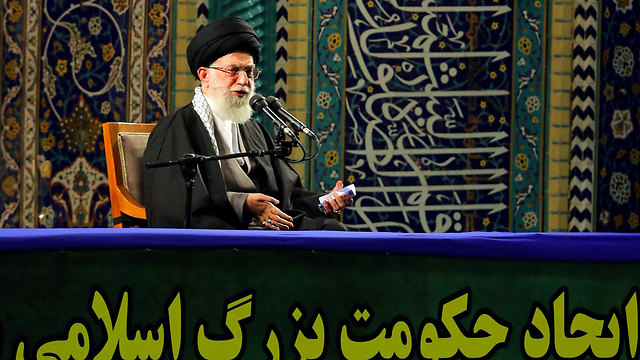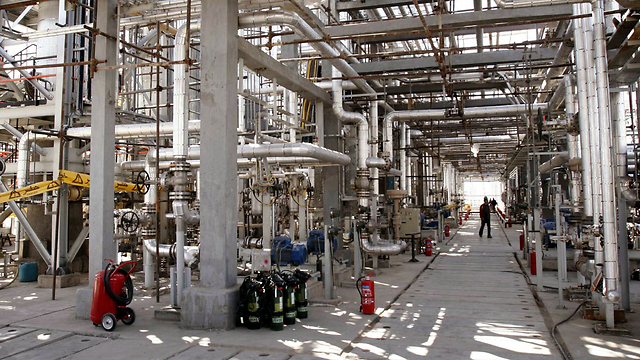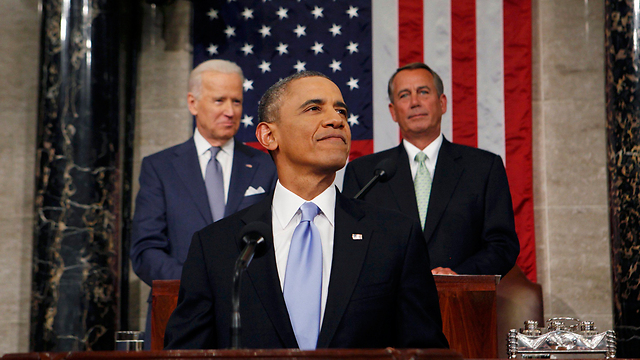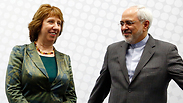
At Iran talks, pessimism is name of the game
Analysis: Ron Ben-Yishai discusses the different scenarios available as the two sides meet in Vienna for more talks.
The Americans and Europeans are oozing pessimism to prove to the Israelis and Saudis that they are not over-enthusiastic about falling into the Iranians' arms and reaching a deal at any cost. The pessimism serves the senior Western officials also as a means of applying pressure on the Iranians (if you don't give us centrifuges – the sanctions won't be lifted) and in order to prevent businesspeople from rushing to Tehran prematurely.
Supreme leader Ali Khamenei is also openly pessimistic to signal to the conservative ayatollahs and the Revolutionary Guards that he is not in the pocket of Hassan Rouhani, who aspires to open up to the West, and also to show the Americans and Europeans that he will not give up on his principles.
In other words, he will not agree to give up on the nuclear abilities he has already gained as a precursor to a bomb, and will make it clear that the Americans are the ones who should pay for Iran opening up to the West – not the other way around.
Netanyahu is holding steadfastly to Israel's traditional stance, which rejects any concession that could be used directly or indirectly for the production of an Iranian nuclear weapon. He is doing so not only to apply pressure on Barack Obama and the Europeans to not yield even a little to the Iranians, but also to preserve the unity in the ranks of those in Congress who favor further sanctions. No one wants to be the good cop in this situation, but Netanyahu has definitely taken upon himself to be the bad cop. Obama, in his heart of hearts, may even be happy with that.
Iran setting conditions
Beyond the preliminary game, there is nitty gritty of the talks. The results of these negotiations, which began Tuesday and are scheduled to last for another six months, may increase (or significantly decrease) the amount of fuel vapor in the Middle Eastern air. They will directly impact on the chances of ending the civil war in Syria and even the chances of reaching some kind of agreement in the Israeli-Palestinian conflict.
Western officials are convinced that signing a "bad deal" – allowing Iran to make a breakthrough towards a nuclear weapon and produce it shortly after the supreme leader decides to do so – may seriously undermine the little stability left in the region, and also serve as a potential threat to world peace.
In light of these dismal opening positions, the chances of reaching an agreement really do seem slim. Upon closer inspection of each parties' demands, technical details and talks' procedures aside, Iran is demanding to remain a "threshold state" in terms of creating fissile material used to produce the core of a nuclear weapon. They are not even willing to discuss the development of the weapon itself.
In other words, Iran is demanding to preserve its abilities to enrich uranium, and keep the enriched uranium it has already stockpiled (which could be used to produce four or five nuclear warheads).
Furthermore, Iran is demanding that all sanctions are lifted in return for not extending its uranium enrichment abilities and for freezing its ability to create fissile material from plutonium at the Arak reactor. For now, the Iranians are not willing to reveal the extent of the efforts they have made, are making and will make to develop an actual nuclear weapon. In fact, they won't even admit that these efforts exist.
Simply put, Iran is demanding a complete withdrawal of the sanctions, but is not willing to give up on its position as a threshold state. The West will have to rely on Iran's written commitment as part of a signed agreement, God willing, that it is not trying and will not try to develop and produce a nuclear weapon.
Cut, halt, commit
On the other hand, the P5+1 (five permanent members of the UN security council and Germany), are demanding that Iran significantly reduce the uranium enrichment capabilities it has today, so that it will not be able to make a breakthrough within a few weeks and produce fissile material for a secret nuclear weapon.
The powers have already agreed in principle, as part of an interim agreement signed last November, that Iran can enrich uranium – contrary to UN Security Council resolutions and the Israeli and Saudi Arabian position. But now they are demanding that Iran cut the number of its centrifuges by 75 percent, and avoid stockpiling any more uranium enriched to a lower level.
The world powers are also demanding that Iran stop building a reactor and facilities accompanying the production of fissile material (plutonium) from used fuel rods. If Iran accepts this demand, it will stop being a threshold state and the West will have more than a year's warning if Tehran tries to make a breakthrough towards building a bomb. This will allow the West to properly prepare its options to prevent such a breakthrough, including a military response.
The willingness to compromise of the P5+1 is in direct opposition to the unequivocal and one-dimensional Israeli and Saudi perception: Iran must not be allowed to keep any uranium enrichment or plutonium production capabilities. Its program must be broken down to the very last screw - from the gas conversion facility (used to feed the centrifuges) to the Fordo centrifuge facility inside a mountain near Qom.
Riyadh and Jerusalem are also demanding that Iran halt construction on the heavy water reactor at Arak, a demand stemming from past experience of the Iranians deceiving the world over every move they made in their nuclear program.
Another unequivocal demand is that Iran reveal to the International Atomic Energy Agency (IAEA) what it has already done to develop a nuclear weapon and missile warheads. Some will argue that this stance is unrealistic, but official Israel – at the specific order of Benjamin Netanyahu – is working tirelessly to convince the powers to adopt this approach. This was the purpose of National Security Advisor Yossi Cohen's trips to almost every signifcant capital for discussions with officials dealing with the nuclear issue and the policy on Iran.
What does success depend on?
Given this state of affairs, it's hard to predict what will happen at the end of the process. The success or failure of the negotiations depend on many variables:
The sanctions. Still valid, these have a direct impact on the Iranian economy. The fact that Iran cannot export large quantities of oil and engage in financial deals indirectly threatens the survival of the Islamic regime.
Internal Iranian struggle. The results of the battle inside Iran between the camp opposing openness towards the West and the camp supporting Rouhani and Foreign Minister Mohammed Zarif.
Steadfastness of the West. The determination of the world powers (primarily the US and Europe) in their demands of the Iranians, including meticulous inspection and verification, and their ability to stop the sanctions from falling apart. In addition, a reliable threat that the sanctions will be stepped up if the Iranians stymie the negotiations.
Bad cops. Coordinated Israeli-Saudi pressure on the US and France.
Military threat. Planning and demonstrating a reliable military option by Israel and the US. For now, as long as negotiations with Iran continue, the military option is frozen. But it must remain in the background, in particular on the part of the US, which the Iranians fear.
What are the possible outcomes?
1. An agreement is signed that pushes the Iranian nuclear program back by at least two years (in the area of uranium enrichment) thereby limiting its ability to break through towards the bomb.
The agreement will also include verifiable restrictions on weapon development and a scrupulous inspection regime. The world powers, in return, will lift all sanctions on Iran. Jerusalem will argue this it is a bad deal that will allow Iran to cheat; but it will accept it on the grounds of having no other choice, call it the lesser of two evils, and double its intelligence efforts to monitor Iran's implementation of the agreement.
2. A "bad deal" – in other words, an agreement with multiple loopholes, including on inspection measures and in areas that may appear to be marginal but are enough to keep Iran on the nuclear threshold, and even secretly advance the arms program. At the same time, the West will lift most sanctions imposed on Iran.
3. If an agreement is not achieved after six months, the interim agreement will be extended and negotiations continue. In such a situation, Iran will be able to stabilize and improve its abilities on the "nuclear threshold", even boosting the resistence of its nuclear facilities and its missiles to a preventive strike from Israel and the US (either together or separately) in the event of a breakthrough towards a nuclear weapon. If in this situation the world powers ease sanctions, it will cause irreversible damage, like the process that failed so many times with North Korea.
These scenarios and others will be at the center of the Netanyahu-Obama meetings in Washington in two weeks, and agreement or disagreement between the two leaders will likely be as important as a formal deal with Iran, which will be signed - or not - in six months in Geneva.










